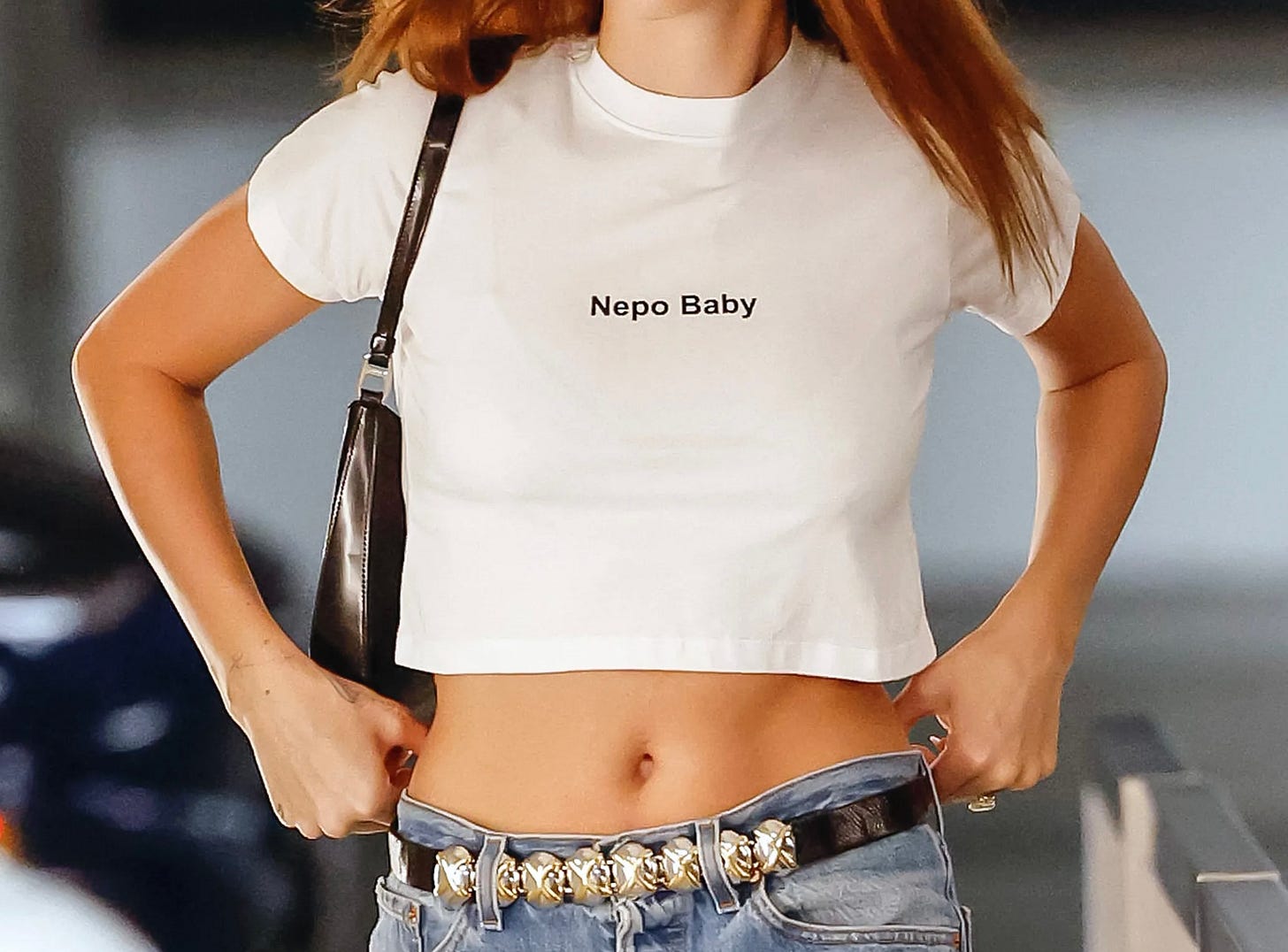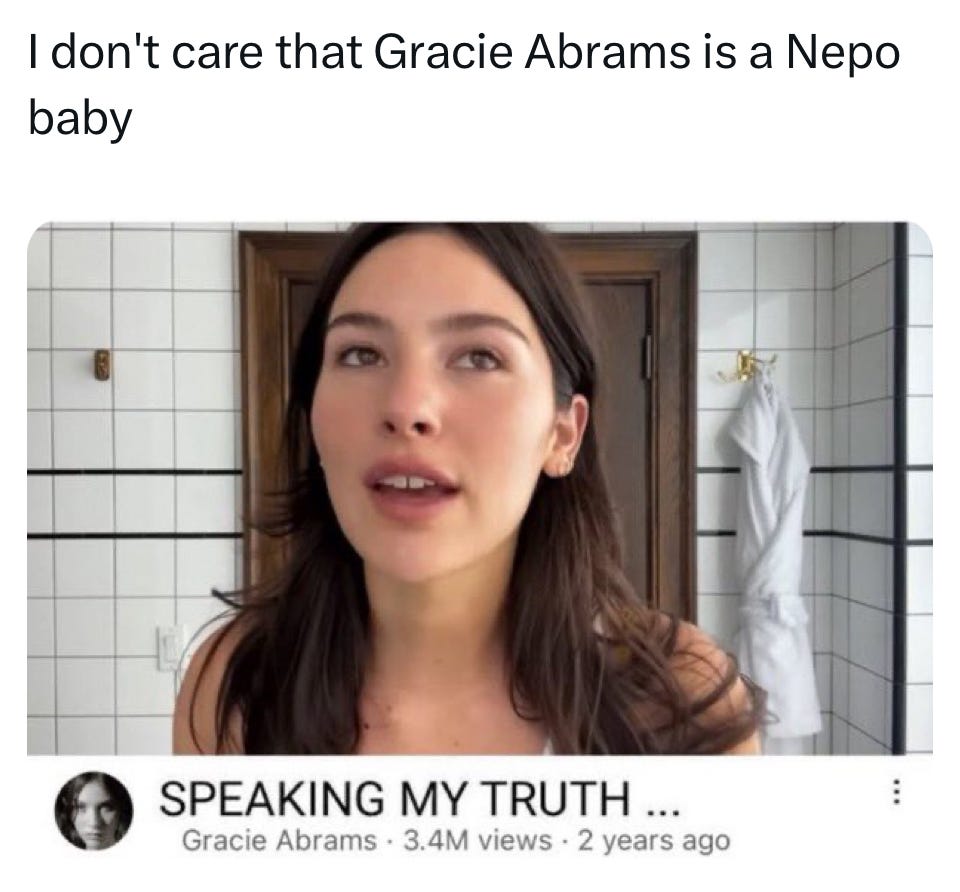Gracie Abrams dropped “The Secret of Us” a couple weeks ago, and as the album climbs the charts, she’s shaping up to be the biggest nepo baby of the summer. I got in the car last week and was shocked to hear “Risk” playing on the radio. All over my Instagram I see videos of girls covering her songs, and she doesn’t really feel like an indie artist anymore. I know it’s bad to not want success for artists you like, but as a committed gatekeeper, I can’t help but feel slightly resentful that the Swifties all found Gracie. She was my favorite artist back in 2021 when she released “This is What it Feels Like,” but I think her work has only gone slightly downhill since then. As she’s gotten more popular, she’s sort of lost the the style that made her earlier music so great: the direct, simple lyrics and soft, whispering voice, which, in songs like “Camden” and “Augusta,” makes the emotional impact of her music feel so effortless, like she can say so much and say it so precisely without even trying that hard.
But alas, Gracie has turned a new page in her career and perhaps speaks to a different audience now. And as she inches her way towards radio pop star status, new eyes have also meant new criticisms. The bigger her music gets, the more people are disappointed to learn that she is actually the daughter of a famous director who made one of the Star Wars movies. This discovery has sealed her status as a “nepo baby,” the begrudging term that we generally assign to famous women who grew up with celebrity connections.
And like most nepo babies, Gracie has some haters these days. I’ve seen more than a few people online call her a talentless singer who merely gets by on her father’s connections. She faced her first real surge of hate a few months ago when she covered Ethel Cain’s “American Teenager” and was pretty quickly and definitively shot down by Ethel’s fans on Twitter. The song didn’t sound great in her voice, but on a deeper level, I think what really fueled the outrage was the underlying sense of irony in Gracie’s choice to cover the song: the indie pop darling, born and raised in Los Angeles, daughter of a big name Hollywood director, tied her hair back in a slightly androgynous way and put on an angsty hoodie to sing a trans woman’s “fake pop song” about generational trauma and growing up poor in the South.
The example well articulates the current positioning of nepo babies in American pop culture. Maude Latour, the daughter of the Wall Street Journal CEO, makes artsy pop songs about getting high and saving the environment. Kaia Gerber, daughter of a famous model and the Casamigos founder, runs an online book club where she posts discussions on radical feminist and anti-racist books. Maya Hawke plays a beloved lesbian character on “Stranger Things” and has since embraced the role as a quasi figurehead in the queer community. Samia opened for boygenius last summer, and she keeps her famous parents a little-known secret as she tries to make a name for herself in the feminist indie sad girl music community.
In all these cases, a pretty obvious pattern starts to emerge. Nearly every “nepo baby” we know is a woman, and most of them, interestingly, tend to disassociate slightly from their upperclass, establishment backgrounds and veer towards the more experimental, artsy, and progressive side of the culture. And in these ventures, these girls are not always very well received. For the most part, we all agree that nepo babies are a bad thing; it’s unfair that some get to worm their way to supermodel/pop star/movie star success because their parents have connections. And yes, I agree, but I also think there’s a troubling underlying sentiment that we subconsciously communicate when we talk about these girls and the unfair systems that have hoisted them to the top of the it-girl hierarchy.
One of my friends once, while making fun of Lily Rose Depp, ridiculed an answer she gave once when asked about being a nepo baby. In a notoriously repudiated statement, Lily said: “If somebody’s mom or dad is a doctor, and then the kid becomes a doctor, you’re not going to be like, ‘Well, you’re only a doctor because your parent is a doctor.’ It’s like, ‘No, I went to medical school and trained.’” Lily faced a lot of backlash for this interview, and my friend, echoing what many others have said online, thought it was ridiculous that Lily would compare her career as an actor to the medical field. “Doctors actually have to work and be smart,” she said. “So it doesn’t matter who their parents are.”
My friend didn’t necessarily realize it, but I think this exact sentiment well sums up our subconscious resentment and scrutiny of nepo babies - or, in a broader sense, really any famous women - and I take I lot of issue with it. I hate when people imply that fancy, “respectable” jobs like doctors require some deeper, more serious work than acting, directing, making music, or making art in any sense - which, when women are involved, we often view as superficial. Art is a sacred thing, and it’s dangerous to dismiss how fundamentally valuable it is to society; how it fosters a culture that, beyond its capitalist, progress-oriented priorities, is concerned with morals, empathy, creativity, the vastness of the human experience, and the never-ending journey to uncover deeper truths about ourselves and the world. I think any woman who ventures into the arts is taking up that challenge in a worthwhile way.
So when we reduce artistic work by women to a simple matter of being pretty and having connections, we are ultimately trivializing the voices of women who are trying to say something important. I don’t necessarily think that Lily Rose Depp is some groundbreakingly brilliant actor (why why why did she take that role in The Idol), but I’m weary of this attitude that treats young women in the arts as superficial, as women who aren’t smart like women in STEM or other “serious” fields. These narratives are the exact trappings of girlboss feminism, which ultimately tries to shove women into preexisting, patriarchal molds of success, without truly listening to and celebrating the novel and unique things that women have to say. The arts, in my eyes, offer the most room for the unique creativity of the feminine perspective to flourish, and so attempts to shut down women in film or music or fashion really just reaffirm patriarchal norms as the ultimate markers of worth in our society.
And in another sense, I think Lily was kind of onto something with that quote that got her into so much trouble. We all know that there is a huge problem with nepotism in American society, and in the grand scheme of things - statistically speaking - that problem is not really that Sofia Coppola got to make “Lost in Translation.” The problem is precisely that the children of doctors are more likely to become doctors and the kids from “good” families get to go to "good” colleges and all the finance bros get jobs on wall street because their dad has some connection. It’s the same conversation that’s happening in basketball right now, since the Lakers drafted Bronny James, who, as many were quick to point out, isn’t necessarily quite good enough to be in the NBA. White people benefit from nepotism every day, but as a culture, we only want to talk about the injustice of it all when those advantages happen to fall into the lap of a Black person for once.
While writing this post, I struggled to think of many white, male nepo baby that we all know and talk about. Obviously they exist, but they fly under the radar a little more. We don’t notice as much when they get to skip the line, because really that’s just the default in most aspects of American society. I’d like to see some more of our nepo baby discourse redirected towards a problem where the socio-economic disparities in our country are playing out at a systemic, mass-scale level - not only when it’s also a convenient excuse to belittle young women.






i love this! as someone who's loved gracie abrams since she started posting online - a lot of the hate surrounding her being a 'nepo baby' felt so baseless and unnecessarily rude. i'm glad that people share similar sentiments! such a great read.